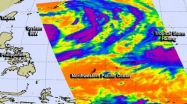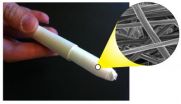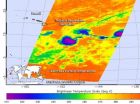(Press-News.org) Scientists studying the potential effects of climate change on the world's animal and plant species are focusing on the wrong factors, according to a new paper by a research team from the Wildlife Conservation Society, University of Queensland, and other organizations. The authors claim that most of the conservation science is missing the point when it comes to climate change.
While the majority of climate change scientists focus on the "direct" threats of changing temperatures and precipitation after 2031, far fewer researchers are studying how short-term human adaptation responses to seasonal changes and extreme weather events may threaten the survival of wildlife and ecosystems much sooner. These indirect effects are far more likely to cause extinctions, especially in the near term.
The review appears online in the international journal Diversity and Distributions.
"A review of the literature exploring the effects of climate change on biodiversity has revealed a gap in what may be the main challenge to the world's fauna and flora," said the senior author Dr. James Watson, Climate Change Program Director and a Principle Research Fellow at the University of Queensland.
The research team conducted a review of all available literature published over the past twelve years on the impacts of climate change on species and ecosystems. In their review, the authors classified studies examining the projected changes in temperature and precipitation as "direct threat" research. Direct threats also included changes such as coral bleaching, shifting animal and plant life cycles and distributions, and habitat loss from sea level rise. Human responses to climate change—including everything from shifting agriculture patterns, the construction of sea walls to protect cities from sea level rise, changes in human fishing intensity, diversion of water, and other factors—were classified as "indirect threats."
The authors found that the vast majority of studies (approximately 89 percent of the research included in the review) focused exclusively on the direct impacts of climate change. Only 11 percent included both direct and indirect threats, and the authors found no studies focusing only on indirect threats.
"The reactions of human communities to these changes should be treated as a top priority by the research community," said Dr. Watson. "The short-term, indirect threats are not merely 'bumps in the road'—they are serious problems that require a greater analysis of social, economic, and political issues stemming from changes already occurring."
INFORMATION:
The authors of the essay are: Sarah Chapman of the University of Queensland; Karen Mustin of the University of Queensland; Anna R. Renwick of the University of Queensland; Daniel B. Segan of the University of Queensland and the Wildlife Conservation Society; David G. Hole of Conservation International and the University of Durham; Richard G. Pearson of University College London; and James E.M. Watson of the University of Queensland and the Wildlife Conservation Society.
Conservation scientists asking wrong questions on climate change impacts on wildlife
Wildlife Conservation Society, University of Queensland, and others urge more focus on more imminent threats
2014-07-30
ELSE PRESS RELEASES FROM THIS DATE:
Antarctic ice sheet is result of CO2 decrease, not continental breakup
2014-07-30
DURHAM, N.H. – Climate modelers from the University of New Hampshire have shown that the most likely explanation for the initiation of Antarctic glaciation during a major climate shift 34 million years ago was decreased carbon dioxide (CO2) levels. The finding counters a 40-year-old theory suggesting massive rearrangements of Earth's continents caused global cooling and the abrupt formation of the Antarctic ice sheet. It will provide scientists insight into the climate change implications of current rising global CO2 levels.
In a paper published today in Nature, Matthew ...
NASA catches two tropical troublemakers in Northwestern Pacific: Halong and 96W
2014-07-30
There are two tropical low pressure areas in the Northwestern Pacific Ocean today and they're close enough to each other to be captured in one image generated from data gathered by NASA's Aqua satellite.
NASA's Aqua satellite flew over both Tropical Storm Halong and developing System 96W early on July 30 and the Atmospheric Infrared Sounder (AIRS) instrument captured infrared data on them in one image. Both systems show powerful thunderstorms stretching high into the troposphere with cloud top temperatures as cold as -63F/-52C. Those thunderstorms have the potential for ...
Watching Schrödinger's cat die (or come to life)
2014-07-30
One of the famous examples of the weirdness of quantum mechanics is the paradox of Schrödinger's cat.
If you put a cat inside an opaque box and make his life dependent on a random event, when does the cat die? When the random event occurs, or when you open the box?
Though common sense suggests the former, quantum mechanics – or at least the most common "Copenhagen" interpretation enunciated by Danish physicist Neils Bohr in the 1920s – says it's the latter. Someone has to observe the result before it becomes final. Until then, paradoxically, the cat is both dead and ...
Fear of losing money, not spending habits, affects investor risk tolerance, MU study finds
2014-07-30
As the U.S. economy slowly recovers, many investors remain wary about investing in the stock market. Investors' "risk tolerance," or their willingness to take risks, is an important factor for investors deciding whether, and how much, to invest in the stock market. Now, Michael Guillemette, an assistant professor of personal financial planning in the University of Missouri College of Human Environmental Sciences, along with David Nanigian, an associate professor at the American College, analyzed the causes of risk tolerance and found that loss aversion, or the fear of losing ...
When cooperation counts
2014-07-30
Everybody knows the shortest distance between two points is a straight line, and now Harvard researchers have evidence that sperm have been taking the familiar axiom to heart.
Though competition among individual sperm is usually thought to be intense, with each racing for the chance to fertilize the egg, Harvard scientists say in some species, sperm form cooperative groups that allow them to take a straighter path to potential fertilization.
A new study, conducted by Heidi Fisher, a post-doctoral student working in the lab of Hopi Hoekstra, Howard Hughes Investigator ...
Scientists call for new strategy in pursuit of HIV-free generation
2014-07-30
In light of the recent news that HIV has been detected in the Mississippi baby previously thought to have been cured of the disease, researchers are assessing how to help those born to HIV-infected mothers. These infants around the world are in need of new immune-based protective strategies, including vaccines delivered to mothers and babies and the means to boost potentially protective maternal antibodies, say researchers who write in the Cell Press journal Trends in Microbiology on July 30th.
"There is a real need for additional HIV-1 prevention methods for infants," ...
Study: Marine pest provides advances in maritime anti-fouling and biomedicine
2014-07-30
A team of biologists, led by Clemson University associate professor Andrew S. Mount, performed cutting-edge research on a marine pest that will pave the way for novel anti-fouling paint for ships and boats and also improve bio-adhesives for medical and industrial applications.
The team's findings, published in Nature Communications, examined the last larval stage of barnacles that attaches to a wide variety of surfaces using highly versatile, natural, possibly polymeric material that acts as an underwater heavy-duty adhesive.
"In previous research, we were trying to ...
Dissolvable fabric loaded with medicine might offer faster protection against HIV
2014-07-30
Soon, protection from HIV infection could be as simple as inserting a medicated, disappearing fabric minutes before having sex.
University of Washington bioengineers have discovered a potentially faster way to deliver a topical drug that protects women from contracting HIV. Their method spins the drug into silk-like fibers that quickly dissolve when in contact with moisture, releasing higher doses of the drug than possible with other topical materials such as gels or creams.
"This could offer women a potentially more effective, discreet way to protect themselves from ...
NASA sees zombie Tropical Depression Genevieve reborn
2014-07-30
Infrared imagery from NASA's Aqua satellite helped confirm that the remnant low pressure area of former Tropical Storm Genevieve has become a Zombie storm, and has been reborn as a tropical depression on July 30.
Tropical Storm Genevieve weakened to a tropical depression on Sunday, July 27 and the National Hurricane Center issued their final advisory on the system as it was entering the Central Pacific. Now, after three days of living as a remnant low pressure area, Genevieve reorganized and was classified as a tropical depression again.
The Tropical Rainfall Measuring ...
Birthweight and breastfeeding have implications for children's health decades later
2014-07-30
Young adults who were breastfed for three months or more as babies have a significantly lower risk of chronic inflammation associated with cardiovascular and metabolic diseases, according to research from the Brown School at Washington University in St. Louis.
"This study shows that birthweight and breastfeeding both have implications for children's health decades later," said Molly W. Metzger, PhD, assistant professor at the Brown School and a co-author of the study with Thomas W. McDade, PhD, of Northwestern University.
"Specifically, we are looking at the effects ...
LAST 30 PRESS RELEASES:
Globe-trotting ancient ‘sea-salamander’ fossils rediscovered from Australia’s dawn of the Age of Dinosaurs
Roadmap for Europe’s biodiversity monitoring system
Novel camel antimicrobial peptides show promise against drug-resistant bacteria
Scientists discover why we know when to stop scratching an itch
A hidden reason inner ear cells die – and what it means for preventing hearing loss
Researchers discover how tuberculosis bacteria use a “stealth” mechanism to evade the immune system
New microscopy technique lets scientists see cells in unprecedented detail and color
Sometimes less is more: Scientists rethink how to pack medicine into tiny delivery capsules
Scientists build low-cost microscope to study living cells in zero gravity
The Biophysical Journal names Denis V. Titov the 2025 Paper of the Year-Early Career Investigator awardee
Scientists show how your body senses cold—and why menthol feels cool
Scientists deliver new molecule for getting DNA into cells
Study reveals insights about brain regions linked to OCD, informing potential treatments
Does ocean saltiness influence El Niño?
2026 Young Investigators: ONR celebrates new talent tackling warfighter challenges
Genetics help explain who gets the ‘telltale tingle’ from music, art and literature
Many Americans misunderstand medical aid in dying laws
Researchers publish landmark infectious disease study in ‘Science’
New NSF award supports innovative role-playing game approach to strengthening research security in academia
Kumar named to ACMA Emerging Leaders Program for 2026
AI language models could transform aquatic environmental risk assessment
New isotope tools reveal hidden pathways reshaping the global nitrogen cycle
Study reveals how antibiotic structure controls removal from water using biochar
Why chronic pain lasts longer in women: Immune cells offer clues
Toxic exposure creates epigenetic disease risk over 20 generations
More time spent on social media linked to steroid use intentions among boys and men
New study suggests a “kick it while it’s down” approach to cancer treatment could improve cure rates
Milken Institute, Ann Theodore Foundation launch new grant to support clinical trial for potential sarcoidosis treatment
New strategies boost effectiveness of CAR-NK therapy against cancer
Study: Adolescent cannabis use linked to doubling risk of psychotic and bipolar disorders
[Press-News.org] Conservation scientists asking wrong questions on climate change impacts on wildlifeWildlife Conservation Society, University of Queensland, and others urge more focus on more imminent threats





